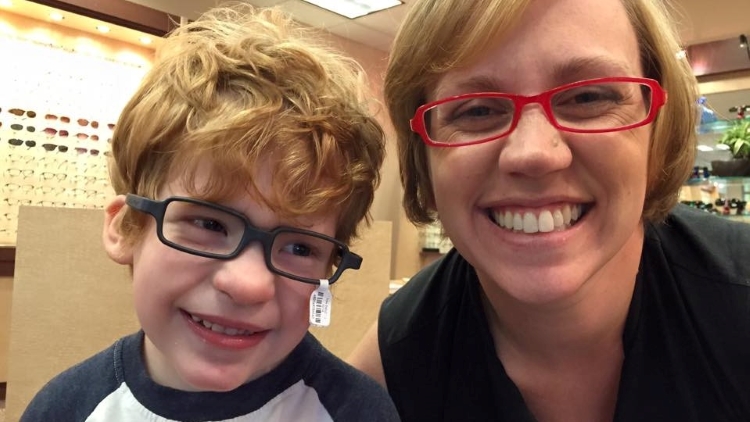Sitting at the kitchen table of my not-quite-unpacked kitchen, just a couple scant weeks since we’d uprooted our little family and moved 600 miles north, I watched Ben’s expression grow more focused and intense as he scribbled down a few notes from the caller on the other end. What I didn’t know in that exact moment was that our pediatrician had just delivered “the” news about Reed’s diagnosis. Ironically, when we did the genetic testing, our pediatrician did it as a measure of “let’s cross this off our list” because she — and we — didn’t expect for anything to turn up from these tests. That was dinner time.
Sitting on the futon in our dimly lit basement, we began calling family, putting an identity to all the questions and uncertainties we’d faced with Reed’s development up to that point. I remember feeling relieved to finally know there was a reason for all of this but dismayed at the complexity and rarity of his disorder. In some ways I couldn’t reconcile the diagnosis with the real, living little boy that slept upstairs in our new house. That was bed time.
Dinner and bed times continued to accumulate, day after day, and the doctor’s appointments and therapy evaluation list grew long and longer yet. Strangers began showing up at my house, sent by the Early Intervention program, to work with Reed and help us help his development. Mandy. Catherine. Trish. Rebecca. Angie. Patty. Sue. Amber. Then, Geneticist. Endocrinologist. Opthamolgist. Pulmonlogist. Immunologist. Cardiologist. An intrusion into what was theoretically my normal life — at least at first. I really can attest that the first stage of grief is denial. An extrovert my whole life and all I wanted was to retreat, retreat, retreat behind the closed doors of my home and heart. The thought of a support group — where I imagined everyone stood around feeling sorry for themselves — made me nauseous.
But, you know, a pity party can only last for so long. And I began to realize that those strangers, those ones who showed up at my door week after week to help my precious son, they would become friends. And those medical specialists were our allies as we sought understanding and help. And I began to understand how much research and science and community support has brought us. How much we have to be thankful for because this could have been so much harder, so much more isolating.
This week I’m particularly thankful for an organization introduced to us by the very first genetic counselor we spoke to after the diagnosis: Unique. While based in the UK, this international organization provides up-to-date research and information on rare chromosome disorders, like the one Reed has. And this week Unique is celebrating Rare Chromosome Awareness week. This week will you join us in celebrating Reed and his own unique-ness and in honoring an organization that so greatly benefits our family?
To learn more about this organization, click on this link.


